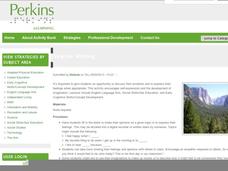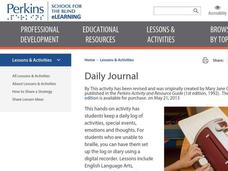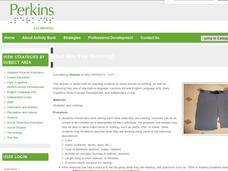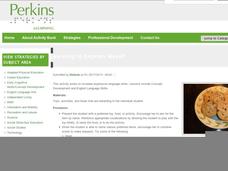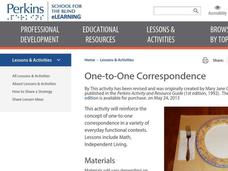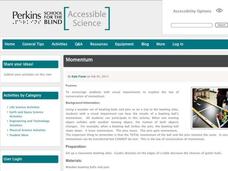Perkins School for the Blind
Familiar Sounds
To foster concept development and auditory discrimination skills, learners with visual impairments listen to identify a variety of common sounds. The teacher makes recordings of various sounds, including those found in the home, at the...
Perkins School for the Blind
The Price is Right
Go on a shopping trip to practice estimation, price value, and shopping skills. The class heads off to the market to purchase several items for the activity. While they are there, they discuss the cost of various foods and even...
Perkins School for the Blind
Safety Skills
Learning how to stay safe in a dangerous situation is of utmost importance, especially when you have a visual impairment or special need. The teacher makes up a set of dangerous scenario cards based on the provided set of guiding...
Perkins School for the Blind
Telephone Skills
What kid doesn't love talking on the phone? Learners with visual and intellectual disabilities get comfortable using several types of telephones. They begin by examining the phone, dialing, answering the phone, and then they work into...
Perkins School for the Blind
Left Versus Right
When you can't see, it is extremely important to be able to reorient yourself. Learners with visual impairments work though an activity to build spacial awareness based on moving left and right. A marker (bracelet, bell, or weight) is...
Perkins School for the Blind
Prepositions
When most children learn about prepositions, they are provided with a visual to show them the concepts of on, in, near, and beside. For learners with visual impairments, concepts need to be constructed in a very concrete way. A stuffed...
Perkins School for the Blind
Encouraging Students Who are Blind or Visually Impaired to Express Their Feelings and Explore Imagination
Being expressive in a creative, empathetic, or imaginative way is not only fun, it builds good pre-writing and communication skills. Learners with visual impairments have a roundtable discussion session where several sentence frames are...
Perkins School for the Blind
Daily Journal
Keeping a daily journal is fun. It builds strong writing skills and provides an expressive outlet. For children with visual impairments, it's even more important. It provides a way for them to connect written word with real events, which...
Perkins School for the Blind
Learning Names of Articles of Clothing
What to wear today; such a vexing question. Spend some time introducing the names, fabrics, types, colors, and functions of various articles of clothing to your class. Each child will take turns asking each other what they are wearing....
Perkins School for the Blind
Learning to Express Myself
Expressing one's wants and needs is vital for learners of any age or ability level. Young children with visual impairments and intellectual disabilities practice asking for preferred items, foods, or activities in a structured manner....
Perkins School for the Blind
Let's Pretend
Playing pretend with real objects or concepts is a wonderful way for learners to make object-to-action connections, as well as practice daily living skills. Learners with visual and intellectual disabilities use a wide variety of real...
Perkins School for the Blind
Kitchen Clean-up
If you make a meal, you must clean up the mess. Foster a sense of independence while having learners practice a skill they can use in the workplace. Teens with visual impairments practice cleaning, organizing, stacking, and sorting a...
Perkins School for the Blind
Coin Identification
You got some money, and you're not afraid to use it. Before you can use that money, you need to know what it's worth. Included is a set of activity instructions that will help your visually impaired learners indentify coins. Pupils are...
Perkins School for the Blind
Planning a Special Event
I love planning parties, they are a great way to get social, require organizational skills, and engage cooperative problem solving. Teens with visual impairments put their heads together to plan an event for their friends. They choose an...
Perkins School for the Blind
Eating Out
Going out to lunch, reading a menu, making choices, and spending time socializing are all parts of growing up. Teens with visual impairments use several braille menus from local restaurants to practice ordering and appropriatelyeating...
Perkins School for the Blind
One-to-One Correspondence
Here is an interesting way to build concept understanding regarding one-to-one correspondence. Learners with visual impairments will use an array of everyday objects in context to foster an understanding of what one-to-one correspondence...
Perkins School for the Blind
Balance Stations
Children with visual impairments need to continuously work on balance, gross motor skills, and mobility. Foster mobility and orientation skills by engaging them in a series of fun balance stations during PE. You'll set up each of the...
Perkins School for the Blind
Building a Basic Series Circuit
Make science a fully accessible subject for your learners with visual impairments. They'll use tactile models to explore the nature of basic electrical circuits. Template board, wires, batteries, and Velcro are used to construct the...
Perkins School for the Blind
Conductors of Heat - Hot Spoons
Why is the end of a spoon hot when it's not all the way in the hot water? A great question deserves a great answer, and learners with visual impairments will use their auditory and tactile senses to get that answer. A talking...
Perkins School for the Blind
The Mystery Box - Making Observations and Collecting Data
Making observations and collecting qualitative and quantitative data is a vital skill all scientists need to practice. Help your scientists with partial and no sight learn how to use their other senses to make observations for...
Perkins School for the Blind
Safety Crash Testing
Everyone knows that cars have safety features, but wouldn't it be fun to design your own? Learners with visual impairments build a ramp and then attempt to use the material provided to design a safety system to protect a raw egg from a...
Perkins School for the Blind
Testing the Strength of a Column
Columns have been used throughout the world because they are good load-bearing structures. Learners with visual impairments conduct an experiment to work through the design process as well as to understand this engineering phenomenon....
Perkins School for the Blind
Introduction to Scientific Inquiry
Every great scientist knows that the process of inquiry is a very important skill. Provide your learners with visual impairments with an opportunity to explore objects scientifically. They examine several pieces of fruit and generate...
Perkins School for the Blind
Momentum
The laws of momentum can lead to fun! Learners with visual impairments use bowling pins and a bowling ball to model the law of conservation of momentum. They take turns bowling with differing degrees of force to explore how energy is...








